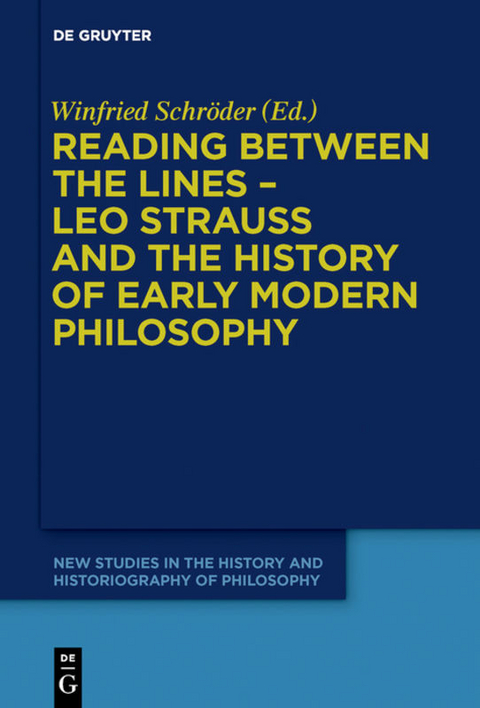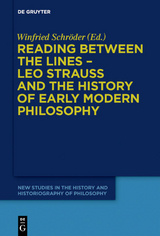Reading between the lines – Leo Strauss and the history of early modern philosophy
Seiten
2015
De Gruyter (Verlag)
978-3-11-042749-3 (ISBN)
De Gruyter (Verlag)
978-3-11-042749-3 (ISBN)
The series publishes monographs and essay collections devoted to the history of philosophy as well as studies in the theory of writing the history of philosophy. A special emphasis is placed on the contextualization of philosophical historiography into the areas of the history of science, culture, and the wider scope of intellectual history.
Since its publication in 1952, Leo Strauss's Persecution and the Art of Writing has stirred considerable controversy, particularly among historians concerned with early modern philosophy. On the one hand, several scholars share his view that it would be inadequate to generally take at face value the explicit message of texts which were composed in an era in which severe sanctions were imposed on those who entertained deviating views. ‘Reading between the lines’ therefore seems to be the appropriate hermeneutical approach. On the other hand, the risks of such an interpretative maxim are more than obvious, as it might come up to an unlimited license to ascribe heterodox doctrines to early modern philosophers whose manifest teachings were in harmony with the orthodox positions of their time. The conributions to this volume both address these methodological issues and discuss paradigmatic cases of authors who might indeed be candidates for a Straussian ‘reading between the lines’: Hobbes, Spinoza, and Bayle.
Since its publication in 1952, Leo Strauss's Persecution and the Art of Writing has stirred considerable controversy, particularly among historians concerned with early modern philosophy. On the one hand, several scholars share his view that it would be inadequate to generally take at face value the explicit message of texts which were composed in an era in which severe sanctions were imposed on those who entertained deviating views. ‘Reading between the lines’ therefore seems to be the appropriate hermeneutical approach. On the other hand, the risks of such an interpretative maxim are more than obvious, as it might come up to an unlimited license to ascribe heterodox doctrines to early modern philosophers whose manifest teachings were in harmony with the orthodox positions of their time. The conributions to this volume both address these methodological issues and discuss paradigmatic cases of authors who might indeed be candidates for a Straussian ‘reading between the lines’: Hobbes, Spinoza, and Bayle.
W. Schröder, Philipps-Universität Marburg.
| Erscheint lt. Verlag | 3.11.2015 |
|---|---|
| Reihe/Serie | New Studies in the History and Historiography of Philosophy ; 3 |
| Verlagsort | Berlin/Boston |
| Sprache | englisch |
| Maße | 155 x 230 mm |
| Gewicht | 457 g |
| Themenwelt | Geisteswissenschaften ► Philosophie ► Erkenntnistheorie / Wissenschaftstheorie |
| Geisteswissenschaften ► Philosophie ► Philosophie der Neuzeit | |
| Schlagworte | Atheism • Atheismus • Early modern philosophy • free thought • Freidenker • Frühe Neuzeit • hermeneutics • Hermeneutics; free thought; atheism; early modern philosophy • Hermeneutik |
| ISBN-10 | 3-11-042749-4 / 3110427494 |
| ISBN-13 | 978-3-11-042749-3 / 9783110427493 |
| Zustand | Neuware |
| Haben Sie eine Frage zum Produkt? |
Mehr entdecken
aus dem Bereich
aus dem Bereich
die Grundlegung der modernen Philosophie
Buch | Softcover (2023)
C.H.Beck (Verlag)
CHF 25,20
Buch | Softcover (2023)
Reclam, Philipp (Verlag)
CHF 9,80



![Was heißt Denken?. Vorlesung Wintersemester 1951/52. [Was bedeutet das alles?] - Martin Heidegger](/media/113619842)
